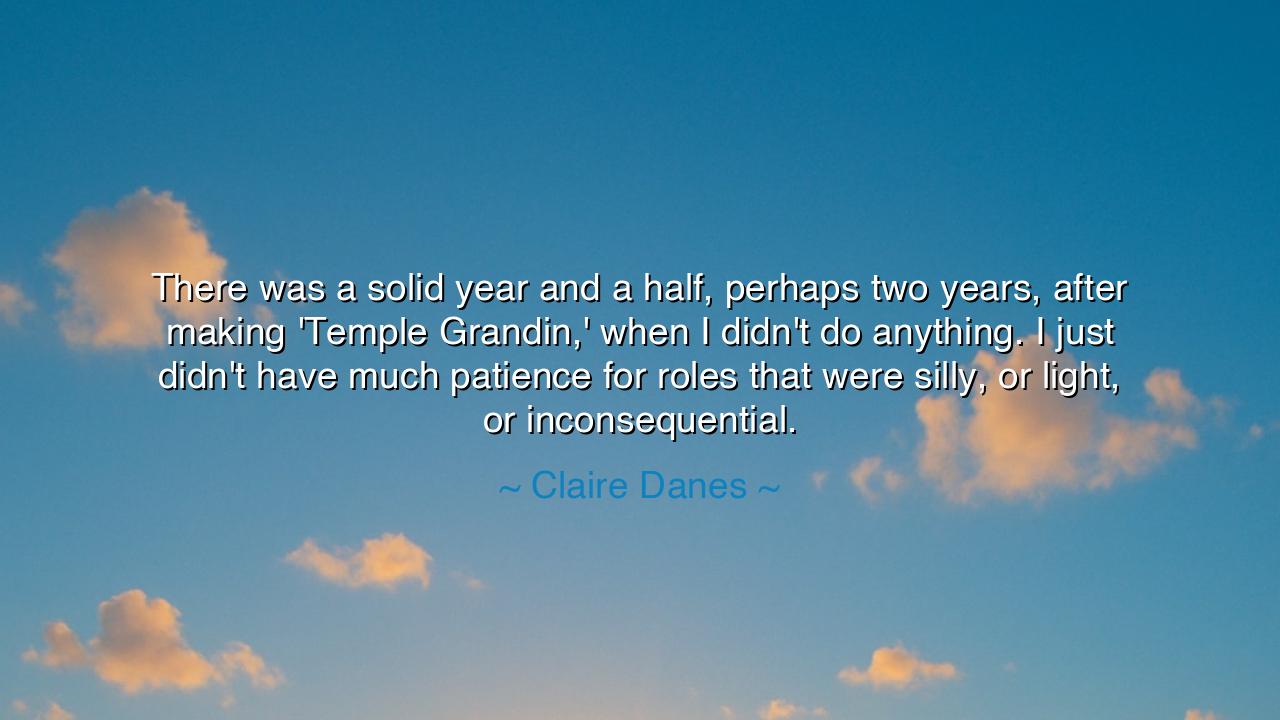
There was a solid year and a half, perhaps two years, after
There was a solid year and a half, perhaps two years, after making 'Temple Grandin,' when I didn't do anything. I just didn't have much patience for roles that were silly, or light, or inconsequential.






Claire Danes, an actress of rare depth, once declared: “There was a solid year and a half, perhaps two years, after making Temple Grandin, when I didn’t do anything. I just didn’t have much patience for roles that were silly, or light, or inconsequential.” In these words lies a truth that transcends the world of performance: once the soul has touched something profound, it is no longer satisfied with the shallow. Having lived in the skin of greatness, the heart resists returning to triviality.
The ancients would have understood this feeling well. For when a warrior has stood upon the battlefield and tasted the weight of destiny, he no longer cares for games of children. When a philosopher has glimpsed the eternal forms, he finds the chatter of the marketplace empty. So too did Danes, after embodying Temple Grandin—a role that demanded empathy, discipline, and courage—discover that her spirit could no longer be nourished by inconsequential parts. Patience for the trivial had left her, replaced by a hunger for meaning.
The origin of this truth can be found in every age. Think of the writer Tolstoy, who after penning War and Peace, a work vast and deep as an ocean, could not abide the thought of returning to lesser subjects. His heart had been expanded, his soul stretched wide; only weighty matters could now satisfy him. So it was with Danes: the year and a half she took was not idleness, but a sacred pause, a refusal to betray the depth she had touched by diluting her art in silliness.
There is also within her words a reminder about the cost of integrity. Many would have rushed to new roles for the sake of fame or fortune, seizing whatever came. But Danes chose the harder road, one of waiting, of silence, of saying “no” until something worthy appeared. This is the path of the true artist: not to fill time with noise, but to guard the sacred flame of craft against corruption. For she knew that what one chooses to embody shapes not only the work, but also the self.
History gives us the story of Cincinnatus, the Roman farmer who was called to lead Rome in its hour of need. He achieved victory, then returned to his fields, refusing power that was not worthy. He too had no patience for pursuits that were inconsequential after touching the heights of duty. His story reminds us that greatness demands discernment, the ability to turn away from what is beneath the dignity of one’s calling. Danes’ choice to wait echoes that same strength.
The lesson for us, dear listener, is clear: once you have touched something profound, do not hurry back into the shallow. Guard your spirit against what is trivial. Whether in art, in work, or in life, remember that not everything deserves your time. Have the courage to wait, as Danes did, until you find that which nourishes the soul. Patience is not weakness; it is the discipline of those who refuse to waste their gift.
So let Claire Danes’ words be to you both guidance and challenge: seek the work, the roles, the actions that are not silly nor inconsequential, but worthy of your life’s energy. And if such things do not yet appear, then wait, even if it be for years. For to say “no” to the empty is to keep yourself open for the meaningful. And in that sacred waiting, you preserve the strength to rise again when true purpose calls. Better to stand still in integrity than to run swiftly into emptiness.






AAdministratorAdministrator
Welcome, honored guests. Please leave a comment, we will respond soon